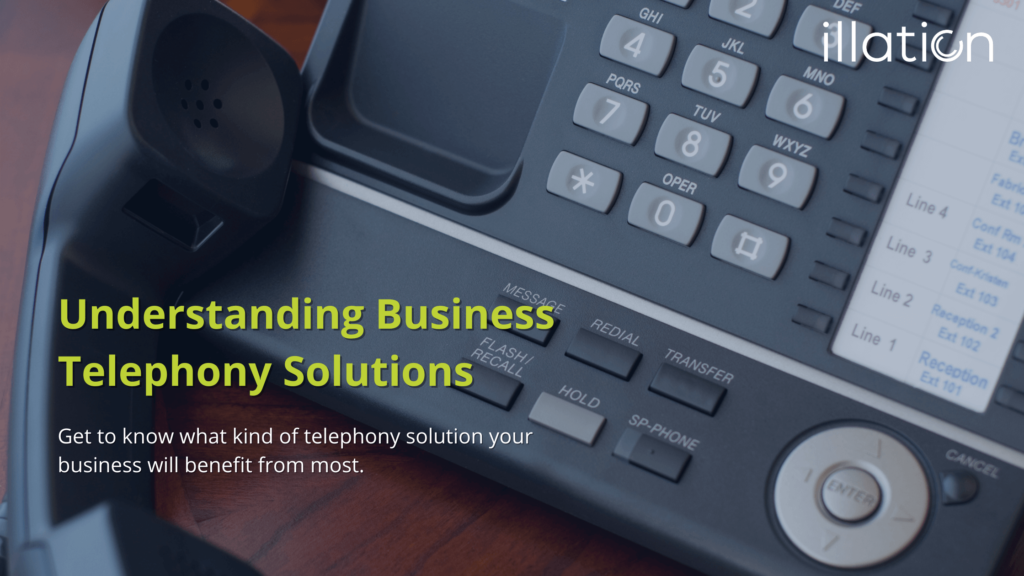Communication is a vital part of any business. Telephony remains one of the key ways many businesses interact with customers. But how can your company get the most out of its business telephony solution?
Navigating business telephony solutions can seem daunting at first. You might encounter a fair amount of industry-specific terminology, yet feel unable to discern the differences between solutions based on the terminology used.
In reality, there are a few terms that you should familiarise yourself with if you want to make an informed buying decision, but understanding the basics of business telephony needn’t be complicated.
What Is Business Telephony?
Firstly, it’s good to understand how business phone systems differ from regular ones. For the most part, many of the same principles apply across both business and regular telephony. However, business telephony solutions normally have better functionality to allow for ease of use in a company setting.

A few of the features a business telephony system can offer over and above a regular one includes the following.
Call Transferring
This is a basic feature whereby individuals can transfer calls to relevant persons within the company. For instance, reception could transfer an incoming call to the financial or managerial departments, or specific individuals with their own extensions.
Business telephony solutions also allow calls to be placed on hold during transfers or while employees are busy clarifying customer queries.
Automated Voicemail Messages
Often times, customers might try to phone outside of normal business hours. To help clarify your company availability, you can integrate automated voicemail messages into your business telephony solution. These messages can be set to automatically kick in after-hours, over public holidays and on weekends – depending on the availability of your business at these times.
Improved Call Monitoring
Overall monitoring on any business phone system is easier. Using a business phone system, your company can monitor how many calls drop and how many incoming calls each company department gets monthly.
Most phone systems can also provide phone operators with the numbers the incoming calls are coming from. This feature lacks in standard landlines, but is useful if there’s a need to phone customers back.
For instance, if a call drops unexpectedly and staff members didn’t take a customer’s number, they will still be able to phone back the individual customer based on information supplied by the telephony system.
Even when call monitoring is enhanced in these simple ways, it can make a big difference to the overall efficiency of your company phone system.
Improved Flexibility and Availability
Using a standard landline is limiting in that customers can only reach employees who are in-office. However, with business a business phone system, companies can appoint emergency numbers that allow customers to reach company employees at any time, anywhere.
This is especially useful for businesses where customers could require support or emergency assistance after hours.
Although appointing an emergency mobile phone number can seem like an easier way to manage an emergency contact number, there are drawbacks. For instance, only one employee will have access to the mobile phone – whereas various employees can be available to answer emergency calls on the same support number using a specialised business telephony solution.
What Is a PBX?
PBX stands for Private Branch Exchange. However, the term is simply meant to refer to a business telephone system with enhanced functionality as mentioned above.

A PBX system is a dedicated telephony network built specifically for a business entity. With a PBX system, users are easily able to communicate internally from one phone extension within the company to another. Users can also make and receive external calls, as well as transfer any active calls from one user to another.
Simply put, a PBX phone system is a back-office telephony system that has the necessary functionality to improve the ease of company communication both internally and externally.
PBX vs IP-PBX Systems
PBX and IP-PBX systems are largely the same. Both offer companies a back-office business telephony solution – the only difference being that IP-PBX systems don’t require traditional telephony infrastructure. Instead, IP-PBX systems function via Internet Protocol whereas traditional PBX systems work through physical infrastructure.
With traditional PBX systems, installing a back-office voice solution requires wiring to lay down the network. Each extension within the network requires its own physical infrastructure, which makes PBX systems expensive to install and difficult to scale.
An IP-PBX system is considerably easier to deploy, seeing as there’s no need for physical setup of the system. Another benefit is that the option to use softphones eliminates the need to buy special proprietary phones.
What Are Softphones?
Softphones (essentially short for ‘software phones’) are phones that make use of VoIP (short for voice over IP) to make calls instead of relying on a traditional telephone network.

Voice over IP refers to the ability to make calls through an internet connection as opposed to a telephone network. By now, everyone is familiar with the concept of voice over IP, as this is the method of calling used by applications like WhatsApp, Skype and Microsoft Teams.
Similar to applications such as Skype, softphones can easily be installed on laptops, mobile phones or tablets and simply rely on a stable internet connection to function.
Adding and taking away extensions can easily be arranged with your IP-PBX provider and can be done in a short amount of time.
PBX Systems vs Contact Centre Solutions
If you’re unfamiliar with business telephony solutions, you might be unsure what the difference between a PBX phone system and a contact centre solution is. In actuality, this is also a simple difference.
IP-PBX System Features
IP-PBX systems include all the benefits listed above such as:
- Call transferring
- Easy scalability
- Softphone integration
- Placing customers on hold
- Automated voicemail messages
- Internal and external calling
- Conference calling
The purpose of an IP-PBX system is to allow customers to communicate with your business office.
This kind of phone system is best to use when you simply want to allow customers to reach your business telephonically – but aren’t looking to deploy an all-encompassing customer service or sales solution.
A PBX system will typically connect customers with reception desks, or specific employees within a company rather than dedicated customer service or sales agents.
What Is a Contact Centre Solution?
Contrarily, contact centre solutions connect to dedicated sales or customer service agents. These solutions are advanced and specifically tailored to customer service and sales environments. They allow for enhanced reporting on customer satisfaction, sales and agent performance.
Contact centre solutions offer several advanced features that aren’t typically necessary when deploying a standard IP-PBX business phone system.
Contact Centre Solution Features
Obviously, contact centre telephony solutions include all the same benefits as an IP-PBX system. Easy scalability, call transferring, ability to place calls on hold and automated voicemail messaging. The main difference is the environment a contact centre solution is setup for.
To cater for the contact centre environment, contact centre telephony solutions can have increased functionality, such as speech-to-text, smart diallers, improved reporting, call recording, campaign and list management etc.
Moreover, most modern contact centre solutions offer the ability to integrate with various customer service channels, such as email, social media, web chat, IM and SMS.
In other words, contact centre solutions no longer cater only for customer interaction via telephone. Instead, modern contact centre solutions allow customers to contact a business on a variety of communication platforms.
With contact centre technology, customer service agents can attend to various customer queries and complaints from different channels – all from the same dashboard. A dedicated customer service solution that ingrates various communication platforms is called an omnichannel solution.
About illation
At illation, we help grow your customer confidence through business telephony and CX solutions. Our solutions are highly customisable and focused on your individual business requirements.
Whether you’re in need of a simple IP-PBX setup, hybrid solution (a combination of traditional PBX and digital telephony) or advanced contact centre technology, we’re your partner in efficient business communication.
We partner with some of the world leaders in business telephony, analytics and customer experience. Some of our partners include Gartner-rated companies such as Avaya, Zendesk and Verint. Through our highly reputable partnerships, we offer only the best products and support for all your business needs.




